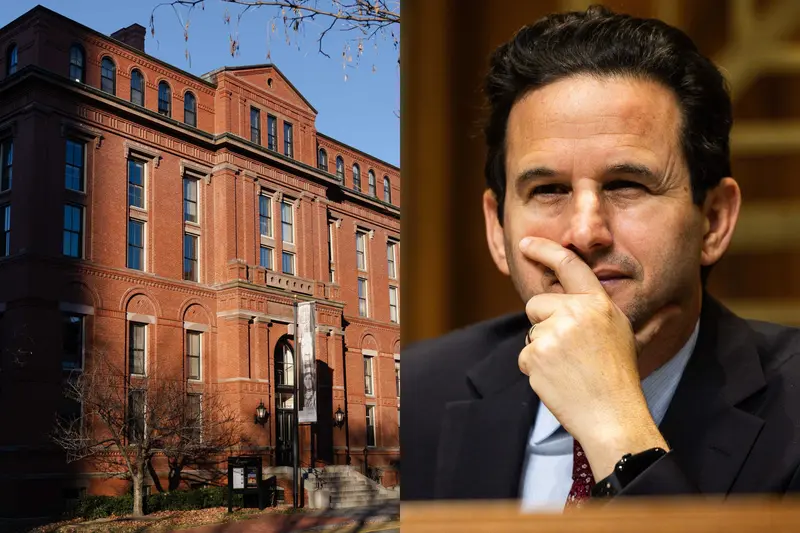U.S. Sen. Brian Schatz of Hawaii demanded on Thursday that museums and universities move more swiftly in repatriating Native American remains and belongings plundered from Indigenous burial sites.
“Give the items back. Comply with federal law. Hurry,” Schatz, a Democrat who chairs the Committee on Indian Affairs, said in a speech from the Senate floor. He urged institutions to devote more resources to fulfilling tribes’ repatriation requests under the Native American Graves Protection and Repatriation Act.
Lawmakers expected the 1990 federal law to result in museums relinquishing all Native American remains to tribes within a decade. But as ProPublica’s Repatriation Project showed last year, some museums stalled or actively resisted tribes’ repatriation requests under NAGPRA.
Institutions have a moral obligation to return human remains to tribes, Schatz said.
“The theft of hundreds of thousands of remains and items over generations was unconscionable in and of itself,” he said. “But the legacy of that cruelty continues to this day because these museums and universities continue to hold onto these sacred items in violation of everything that is right and moral — and importantly, in violation of federal law.”
Out of more than 600 museums nationwide that must comply with the law, 10 hold about half of the nearly 100,000 Native American remains stored in collections across the country, ProPublica’s analysis of federal data found.
Schatz singled out those institutions in his speech as he reiterated concerns expressed in an April letter that he and a dozen other senators sent — citing ProPublica’s reporting — to the Ohio History Connection, Harvard University and three other institutions that held the greatest number of Indigenous remains subject to NAGPRA.
Since the passage of NAGPRA, Schatz said Thursday, museums had wrongly characterized items as “culturally unidentifiable,” a label that until this year institutions had been allowed to use in federal records to say they could not determine which tribe could rightfully claim pieces in their collection. Museums also borrowed collections from one another “so they can never actually be held responsible for them” and engaged with Indigenous communities “as little as possible,” he said.
Schatz’s remarks come at a pivotal moment in the long push by Native Americans, Alaska Natives and Native Hawaiians to reclaim museum holdings taken from ancestral sites.
Following the launch of ProPublica’s Repatriation Project last year, many museums vowed to improve their repatriation records amid the renewed scrutiny. The University of California, Berkeley, which until this fall reported holding more Native American remains than any other institution, filed a federal notice in late October confirming its commitment to repatriate more than half of the remains of the 9,000 Native American ancestors it held.
The Ohio History Connection, which federal data shows now has the largest collection of unrepatriated human remains subject to NAGPRA, said it has also taken steps toward repatriating to tribes. In 2023, a new state law was passed at the urging of the museum to remove potential barriers to repatriation and allow land to be set aside for reburying the ancestral remains of Native Americans.
Overall, in 2023 museums and universities repatriated more ancestral remains and sacred objects to tribal nations than in any prior year during the three decades since NAGPRA’s passage, transferring ownership of the remains of an estimated 18,800 Native American ancestors.
This past month, new federal regulations took effect, setting a series of deadlines over the next several years for museums to consult with tribes and update inventories. The regulations also require museums to obtain consent from tribes before exhibiting funerary items or sacred objects or subjecting Native American remains and belongings to scientific study.
In the past week, some of the nation’s largest and most prominent museums, including the American Museum of Natural History in New York, Field Museum in Chicago, Metropolitan Museum of Art, and Peabody Museum of Archaeology and Ethnology at Harvard University, announced that they will close exhibits or remove sensitive Native American items from display — at least temporarily — as they assess their compliance with the law.
“I feel like it’s like we’re opening a new chapter,” said Meranda Roberts, a citizen of the Yerington Paiute Tribe in Nevada and visiting professor of art history at Pomona College who previously worked at the Field Museum.
In addition to conducting a review of exhibit items, Harvard said it would begin to pay for tribal representatives to travel to the Peabody Museum for the repatriation of ancestral remains and items. Such visits typically happen after months or even years of meetings to determine whether a museum will grant a tribe’s repatriation request.
“We recognize that Tribes face many barriers to the reburial of ancestors but hope that providing these funds will help lessen the burden,” Harvard’s Peabody Museum wrote on its website.
(In November, ProPublica reported that the Penobscot, Passamaquoddy, Maliseet and Mi’kmaq, collectively known as the Wabanaki tribal nations, in present-day Maine, spent three decades asking Harvard to repatriate ancestral remains for reburial.)
Rosita Worl, who has a doctorate in anthropology from Harvard and is president of Sealaska, a nonprofit that promotes and supports Indigenous cultures in southeast Alaska, said the university’s decision to fund travel signifies a “good gesture,” but it doesn’t go far enough in addressing the intense work required by the repatriation process.
“It takes a lot of work, you know, to initiate a repatriation claim,” she said.
Schatz on Thursday acknowledged museums’ recent progress in complying with NAGPRA, including Harvard funding travel.
Schatz said repatriation is a necessary step in restoring justice for Native people who for centuries had “everything stolen from them — their lands, their water, their languages and even their children.” (For decades, many Native American children were forcibly removed from their communities and sent to boarding schools.)
“A big part of that unrelenting, inhumane policy was that the remains of Native ancestors and culturally significant items were also taken from them. Not with permission, but by force. Not discovered, but stolen,” Schatz said.






